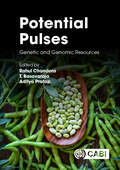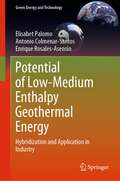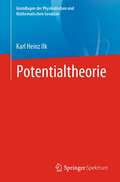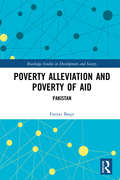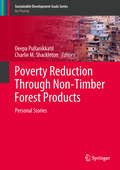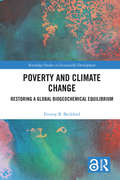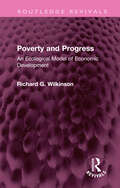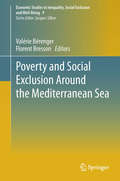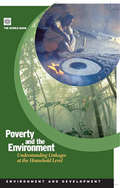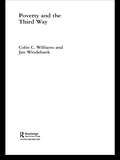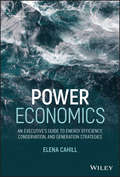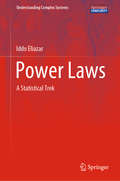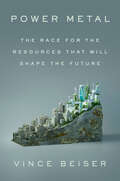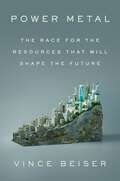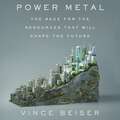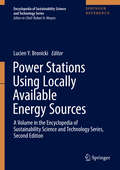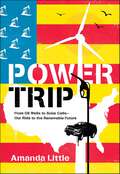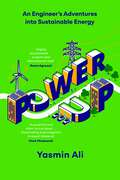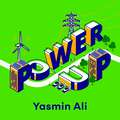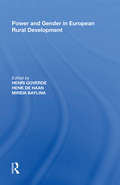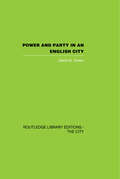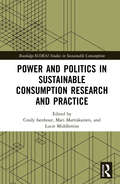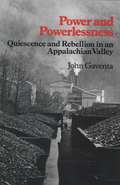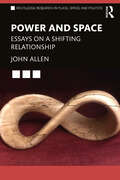- Table View
- List View
Potential Pulses: Genetic and Genomic Resources
by Parul Sharma Amit Kumar Singh Olubukola Oluranti Babalola Dr Mithlesh Kumar Daniel B. Adewale Dr Michael Abberton Gopal Katna Kanishka Chandora Martial Nounagnon Gautier Roko Nadège Adoukè Agbodjato Durand Dah-Nouvlessounon Lamine Baba-Moussa Kirti Rani Shailesh Kumar Jain Moti Lal Mehriya Dr Gayacharan Swarup K. Parida Debashish Chattopadhyay D. C. Joshi P. S. Basavaraj Ramya Rathod Krishna Kumar Jangid K. M. Boraiah C. B. Harisha H. M. Halli Kuldeep Tripathi K. Sammi Reddy Carine Nono Temegne Isabel Milagros Figari Esaïe Tsoata Paul Agendia Francis Ajebesone Ngome Anupam Tripathi S. Gurumurthy C. Mahadevaiah DevindrappaThe fight against global hunger demands a fresh perspective. Lesser-known legumes, often called 'potential pulses', can play a pivotal role. These underutilized powerhouses, including adzuki bean, bambara groundnut, faba bean, cowpea, grass pea and horse gram, among others, are currently untapped resources. Their potential goes beyond their ability to thrive in harsh environments (caused by high temperature, drought, etc.) and fix nitrogen. With increased understanding of these legumes and their genetic and genomic potential, we can unlock a new world of sustainable and nutritious food sources. This book explores: The rich genetic diversity of potential pulses and its role in resilience. How advanced genomics can identify traits for improved yields, pest resistance, and climate adaptation. Strategies for conserving and utilizing these valuable genetic resources. Breeding programmes harnessing genetic potential to create next-generation pulse varieties. Focusing on the untapped genetic and genomic potential of these legumes, this book empowers researchers, breeders, and policymakers to unlock a new era of food and nutritional security. By leveraging the power of their genes, we can transform underutilized pulses into the nutritional heroes of tomorrow.
Potential of Low-Medium Enthalpy Geothermal Energy: Hybridization and Application in Industry (Green Energy and Technology)
by Antonio Colmenar-Santos Enrique Rosales-Asensio Elisabet PalomoThis book highlights the importance of geothermal energy by studying its potential either alone or in combination with solar energy, focusing on its industrial application. Its starting point is to identify in a thorough and precise manner the barriers that hinder the implementation of geothermal energy in Spain and the European Union and the measures to be taken to achieve its diffusion and regular use. Next, the book looks at how geothermal energy could contribute to this sector and to the desalination industry in particular, analysing a specific case in the south of Spain and extrapolating its results to a set of existing desalination plants in the Spanish Mediterranean with really interesting results in terms of economic amortisation and CO2 emissions avoided to the atmosphere. Beyond the desalination industry, this work demonstrates that almost 85% of the industrial processes of all industry in Spain can be carried out with very low, low and medium temperature geothermal resources and even applies its results to a set of existing solar plants, comparing in economic terms the results already obtained with those that would have been obtained if geothermal energy had been applied.
Potentialtheorie (Grundlagen der Physikalischen und Mathematischen Geodäsie)
by Karl Heinz IlkDieses Lehrbuch aus der Reihe „Grundlagen der Physikalischen und Mathematischen Geodäsie“ behandelt die für die Physikalische Geodäsie wichtigen Elemente der Potentialtheorie. Es führt in die feldtheoretischen Aspekte des Gravitationsfeldes ein und erklärt die wichtigen Grundlagen für die Lösung der geodätischen Randwertaufgaben. Der Autor erläutert ausführlich die Darstellung der verschiedenen Gravitationsfeldfunktionale durch Kugelfunktionen sowie die Transformationseigenschaften bei Translation und Drehung des zugrundeliegenden Koordinatensystems. Verschiedene Aspekte der Kugelfunktionen werden außerdem vertieft betrachtet, insbesondere die Darstellungen von Gravitationsfeldwechselwirkungen ausgedehnter Massenanordnungen, also Drehmomente, Gravitationstensor, Gezeitenpotential und vieles mehr.
Poverty Alleviation and Poverty of Aid: Pakistan (Routledge Studies in Development and Society)
by Fayyaz BaqirAid effectiveness has emerged as an intensely debated issue amongst policy makers, donors, development practitioners, civil society and academics during the past decade. This debate revolves around one important question: does official development assistance complement, duplicate or disregard the local resource endowment in offering support to recipient economies? This book draws on Pakistan’s experience in responding to this question with a diverse range of examples. It focuses on a central idea: no aid effectiveness without an effective receiving mechanism. Pakistan is among the top aid recipient countries in the developing economies. It was a shining model in the sixties and it ranks among the highly underperforming countries after the new millennium. This book offers an insight into the dynamics of success and failure of Pakistan in availing foreign financial and technical assistance for human development and poverty alleviation. It draws on field experiences to present case studies on water, shelter, health, education, and health and safety at work to identify the causes and consequences of aid in relation to social reality. Findings relate to developing economies and would be of interest to a wide range of individuals within the development sector.
Poverty Reduction Through Non-Timber Forest Products: Personal Stories (Sustainable Development Goals Series)
by Deepa Pullanikkatil Charlie M. ShackletonThis book narrates personal stories of people from around the world who have used natural products, in particular Non Timber Forest Products (NTFPs) as a means to come out of poverty. Ending poverty remains a major worldwide challenge and is the number one goal under the UN Sustainable Development Goals. The book fills an important knowledge gap; that of personal stories of NTFP users. This has not been part of past publications on NTFPs which tend to focus on statistics and analysis of numbers, thus, the human faces of NTFP users are missing. Narrative stories provide a wealth of data about people and their experiences rather than aggregated classifications, categories and characteristics of poverty. The objective of this book is to illustrate the poverty alleviation potential of NTFPs through documenting the personal life stories of individuals and households that lifted themselves out of poverty through trade of NTFPs. This book is for all who are interested in poverty alleviation and NTFPs.
Poverty and Climate Change: Restoring a Global Biogeochemical Equilibrium (Routledge Studies in Sustainable Development)
by Fitzroy B. BeckfordMost, if not all of the global biogeochemical cycles on the earth have been broken or are at dangerous tipping points. These broken cycles have expressed themselves in various forms as soil degradation and depletion, ocean acidification, global warming and climate change. The best proposal for an organic solution to fixing the myriad broken cycles is a deliberate investment in solutions that first acknowledge the historic roles played by both the subjugated peoples, and the economic beneficiaries of the environmental exploitations of the past. Ever since Europeans made contact with the West, a series of global circumstances including the genocide of the indigenous people of the Americas, the enslavement and global subjugation of Africans, and the emergence of Western concepts of trade dominance and capitalism, have led to deleterious impacts on the global biogeochemical cycles. Addressing the broken biogeochemical cycles should be done with a clear understanding that it was not only human subjects which were subjugated, but also land, water, and air. These three global stores must be replenished from the ideological position that poverty is not simply the absence of money, but is also the lack of access to non-polluting energy sources, to clean air devoid of runaway greenhouse gasses, and to local conditions devoid of climate change instabilities. With this in mind, the global powerbrokers can enter into a new deal with developing nations, shifting the paradigm toward a new ecological approach that rewards good behavior and sets new standards of worldwide relations based on ecologic inclusivity rather than the exclusive economic arrangements currently in order. Harnessing a forward thinking approach to analyzing the current global environmental crisis, this book will be of great interest to students and scholars of sustainable development, political ecology, sustainable agriculture, climate change and environmental justice.
Poverty and Progress: An Ecological Model of Economic Development (Routledge Revivals)
by Richard G. WilkinsonOriginally published in 1973 and now reissued with a new Preface, this striking book challenges the whole structure of our thinking on how societies develop – why some are primitive and others advanced. It demonstrates that the pursuit of progress is not the real driving force behind change. Economic development, it argues, is simply the escape route of societies caught in the ecological pincers of population growth and scarce resources. The author explains the processes by which industrialization is forced upon societies by the progressive scarcity of all land-based resources. The things we think of as the fruits of man's search for progress including increasingly sophisticated technology, labour-saving machinery and the rest - are in fact part of the struggle to keep up with the growing productive task created by ecological pressures. ln this light primitive societies appear less poor than we imagine, and advanced ones less rich.
Poverty and Social Exclusion around the Mediterranean Sea
by Florent Bresson Valerie BerengerThe events taking place in several of South Mediterranean countries since December 2010 show that multiple deprivations may be powerful drivers of political instability. Though improvements of the living conditions have been regularly principal demands along with civil and political liberties in the demonstrations, one of the main striking facts about this so-called "Arab Spring" is that poverty had not been given the same emphasis in southern Mediterranean countries during the last decades as in other areas of the developing and emerging world. Although the growing recognition that poverty is a multidimensional concept, studies of poverty in South Mediterranean countries have often been dominated by a monetary approach. However, there is a growing evidence that it is suitable to go beyond the money-metric measures of poverty and to supplement its results with other approaches that adopt a broader definition of well- being. Though poverty is only one of many causes of this "Arab Spring," we argue that it is a key feature to understand these historic events and that it is necessary to draw a detailed picture of poverty and social exclusion for each one of these countries. Moreover, if the Union for the Mediterranean succeeds in fostering economic cooperation within the Mediterranean area, the focus on the population's well-being of its southern members will deserve scrutiny in the next few years to understand the forces that will drive the Euro-Mediterranean relationships, in particular for migration issues. This book brings together recent advances on the measurement of poverty with empirical applications on South-Mediterranean countries. It introduces new tools for analyzing poverty and shows that the linkages between income and well-being are not straightforward and hinge on many determinants. It shows that the efficiency of poverty reducing policies should also be assessed on the basis of the satisfaction of non-income needs like health, education or participation in social life.
Poverty and the Environment: Understanding Linkages at the Household Level
by World BankDrawing upon recent analytical work prepared inside and outside the World Bank, this report identifies key lessons concerning the linkages between poverty and the environment. With a focus on the contribution of environmental resources to household welfare, the analysis increases our understanding of how specific reforms and interventions can have an impact on the health and livelihoods of poor people. 'Scholars and development practitioners increasingly recognize that in low-income countries there are inextricable links between poverty reduction and natural resources management. Demand has grown immensely for not only more, but better empirical evidence on those links. This volume offers a careful synthesis of key findings from growing literature on the environmental determinants of household welfare, as reflected by indicators of consumption, health, and income. The primary contribution of this study is that is has drawn out vital policy conclusions that will be of value to organizations and governments concerned about poverty and the environment in the developing world.' --Professor Christopher B. Barrett, Cornell University
Poverty and the Third Way (Routledge Studies in Human Geography #Vol. 8)
by Colin C. Williams Jan WindebankWhat is poverty and how can it be tackled? Taking the Third Way out of its narrow party political context, this book argues that it is necessary to harness work beyond employment in order to pave a Third Way beyond capitalism and socialism. The outcome is a thought-provoking new approach towards combating poverty.Poverty and the Third Way uncovers how New Labour's employment-focussed approach causes, rather than resolves, poverty. Searching for another approach, the authors find the seeds of an alternative 'Third Way' in radical European social democratic and ecological thought which seeks to transcend capitalism and socialism by developing work beyond employment. Exploring the reasons why such an approach is needed and how it can be implemented, the authors transcend the 'there is no alternative' to capitalism school of thought dominant in many advanced economies by providing a clearly marked route map of the way towards a post-capitalist economy.
Power Economics: An Executive's Guide to Energy Efficiency, Conservation, and Generation Strategies
by Elena CahillEnergy efficiency is more of a journey than a battle. It starts with small steps, taken at the local and state levels. It is a matter of identifying and then practicing good habits in our daily lives, at home and at work. Every idea and process described in this book, if performed reasonably well, will put money in your pocket. You will not only save money; you will probably make money—and you will take important steps toward saving the planet. Power Economics is a book for thoughtful people who want to cut their energy costs and diminish the harmful effects of greenhouse gas emissions. Climate change and global warming are not speculative fantasies. They are real. They threaten communities, towns, cities, regions, nations, and continents. Even if you don't care about polar bears and penguins, the effects of melting icecaps and shifting ocean currents will transform your life and the lives of the people around you. Power Economics offers practical steps and achievable strategies for reducing the destructive impact of climate change and global warming. Yes, we need energy to live and to sustain our economies. But we don’t need to burn fossil fuels and release CO2 gas at levels that will result in a global catastrophe. There are reasonable alternatives to our current practices. None of the ideas that described in this book are entirely new or totally unfamiliar. They aren't extreme or bizarre. They won't require harsh or draconian measures to work. All of them follow basic rules of common sense and can be achieved at reasonable cost. "I have done my best to convey the complexity and urgency of the matter. I hope that you find this book informative and useful. Working together, we can shed many of our wasteful energy habits and begin the task of building a world that is safe, sustainable and healthy," writes author and energy expert Elena Cahill.
Power Laws: A Statistical Trek (Understanding Complex Systems)
by Iddo EliazarThis monograph is a comprehensive and cohesive exposition of power-law statistics. Following a bottom-up construction from a foundational bedrock – the power Poisson process – this monograph presents a unified study of an assortment of power-law statistics including: Pareto laws, Zipf laws, Weibull and Fréchet laws, power Lorenz curves, Lévy laws, power Newcomb-Benford laws, sub-diffusion and super-diffusion, and 1/f and flicker noises. The bedrock power Poisson process, as well as the assortment of power-law statistics, are investigated via diverse perspectives: structural, stochastic, fractal, dynamical, and socioeconomic. This monograph is poised to serve researchers and practitioners – from various fields of science and engineering – that are engaged in analyses of power-law statistics.
Power Metal: The Race for the Resources That Will Shape the Future
by Vince BeiserThe powerful ways the metals we need to fuel technology and energy are spawning environmental havoc, political upheaval, and rising violence — and how we can do better.An Australian millionaire&’s plan to mine the ocean floor. Nigerian garbage pickers risking their lives to salvage e-waste. A Bill Gates-backed entrepreneur harnessing AI to find metals in the Arctic. These people and millions more are part of the intensifying competition to find and extract the minerals essential for two crucial technologies: the internet and renewable energy. In Power Metal, Vince Beiser explores the Achilles&’ heel of &“green power&” and digital technology – that manufacturing computers, cell phones, electric cars, and other technologies demand skyrocketing amounts of lithium, copper, cobalt, and other materials. Around the world, businesses and governments are scrambling for new places and new ways to get those metals, at enormous cost to people and the planet. Beiser crisscrossed the world to talk to the people involved and report on the damage this race is inflicting, the ways it could get worse, and how we can minimize the damage. Power Metal is a compelling glimpse into this disturbing yet potentially promising new world.
Power Metal: The Race for the Resources That Will Shape the Future
by Vince BeiserThe powerful ways the metals we need to fuel technology and energy are spawning environmental havoc, political upheaval, and rising violence - and how we can do better.An Australian millionaire's plan to mine the ocean floor. Nigerian garbage pickers risking their lives to salvage e-waste. A Bill Gates-backed entrepreneur harnessing AI to find metals in the Arctic.These people and millions more are part of the intensifying competition to find and extract the minerals essential for two crucial technologies: the internet and renewable energy. In Power Metal, Vince Beiser explores the Achilles' heel of "green power" and digital technology - that manufacturing computers, cell phones, electric cars, and other technologies demand skyrocketing amounts of lithium, copper, cobalt, and other materials. Around the world, businesses and governments are scrambling for new places and new ways to get those metals, at enormous cost to people and the planet.Beiser crisscrossed the world to talk to the people involved and report on the damage this race is inflicting, the ways it could get worse, and how we can minimize the damage. Power Metal is a compelling glimpse into this disturbing yet potentially promising new world.
Power Metal: The Race for the Resources That Will Shape the Future
by Vince BeiserThe powerful ways the metals we need to fuel technology and energy are spawning environmental havoc, political upheaval, and rising violence - and how we can do better.An Australian millionaire's plan to mine the ocean floor. Nigerian garbage pickers risking their lives to salvage e-waste. A Bill Gates-backed entrepreneur harnessing AI to find metals in the Arctic.These people and millions more are part of the intensifying competition to find and extract the minerals essential for two crucial technologies: the internet and renewable energy. In Power Metal, Vince Beiser explores the Achilles' heel of "green power" and digital technology - that manufacturing computers, cell phones, electric cars, and other technologies demand skyrocketing amounts of lithium, copper, cobalt, and other materials. Around the world, businesses and governments are scrambling for new places and new ways to get those metals, at enormous cost to people and the planet.Beiser crisscrossed the world to talk to the people involved and report on the damage this race is inflicting, the ways it could get worse, and how we can minimize the damage. Power Metal is a compelling glimpse into this disturbing yet potentially promising new world.
Power Stations Using Locally Available Energy Sources (Encyclopedia Of Sustainability Science And Technology Ser.)
by Lucien Y. BronickiThis volume covers the utilization of geothermal and related energy resources that exploit variations in temperature, chemistry, etc. and require different plant designs and technologies for each location. Extending beyond power plants using geothermal and ocean energy, coverage includes hot dry rock systems, geothermal conditioning, solar ponds, osmotic power, dry air, and potential future deep sea hydrothermal sources. Some technologies have reached the prototype stage, some not even that, but where much work has been invested, it is important to provide a complete picture if only to prevent others from following a dead-end path. For geothermal power plants, the greatest challenge remains the geothermal resource itself. Power conversion is the least uncertain part of a geothermal project, as it consists of a straightforward engineering design with work executed by experienced manufacturers, engineering firms, and contractors. The issues associated with integrating large amounts of ocean energy into the overall supply are also explored.Collecting more than 20 new articles and updated entries, all peer reviewed, this volume in the Encyclopedia of Sustainability Science and Technology, Second Edition, provides an authoritative introduction from exploration techniques to conversion systems for a wide range of locally available energy sources. This comprehensive reference is suitable for those just entering these fields, but also offers new insights for advanced researchers, industry experts, and decision makers.
Power Trip: The Story of America's Love Affair with Energy
by Amanda LittlePower Trip is an adventurous, wonk-free, big-picture, solutions-oriented narrative by leading young journalist Amanda Little that maps out the history and future of America’s energy addiction. Infused with next-generation candor and optimism, Power Trip examines the ways in which oil and coal have shaped America as an international superpower—even as they posed political and environmental dangers to the nation and the world. Hard-hitting yet optimistic, Power Trip is a manifesto for the younger generations who are inheriting the earth.
Power Up: An Engineer's Adventures into Sustainable Energy
by Yasmin Ali'A stimulating and affable overview of how major feats of engineering can help the world beat the climate crisis'NEW STATESMAN'A powerful and often lyrical book ... Fascinating and insightful in equal measure'MARK MIODOWNIK'Ali's enthusiasm for energy infrastructure electrifies this engaging tour of the people and structures that power our modern world'GAIA VINCE'Highly recommend ... a warm and educational read'ROMA AGRAWAL__________We rarely think about the energy systems that prop up our existence. With hot water, lighting and digital entertainment all available at the flick of a switch, it's easy to underestimate the vast global network that makes these things possible.Growing up in Iraq, Yasmin Ali regularly experienced power cuts - ironic for a country rich in oil and sunshine. Now as an engineer working in energy, Yasmin has a deep appreciation for what these resources mean for our lives. In Power Up she takes us on a journey across the globe to reveal the bigger picture, from solar farms shimmering in the desert to power stations hidden deep in the mountains. We discover where we get energy from, how it is moved and used around the world - and why we need to understand the whole system if we want to transition towards a clean, green future.Power Up is a definitive picture of the intricate world that humanity has built, and a rallying cry to face the challenges of climate change using the power at our fingertips.
Power Up: An Engineer's Adventures into Sustainable Energy
by Yasmin Ali'A stimulating and affable overview of how major feats of engineering can help the world beat the climate crisis'NEW STATESMAN'A powerful and often lyrical book ... Fascinating and insightful in equal measure'MARK MIODOWNIK'Ali's enthusiasm for energy infrastructure electrifies this engaging tour of the people and structures that power our modern world'GAIA VINCE'Highly recommend ... a warm and educational read'ROMA AGRAWAL__________We rarely think about the energy systems that prop up our existence. With hot water, lighting and digital entertainment all available at the flick of a switch, it's easy to underestimate the vast global network that makes these things possible.Growing up in Iraq, Yasmin Ali regularly experienced power cuts - ironic for a country rich in oil and sunshine. Now as an engineer working in energy, Yasmin has a deep appreciation for what these resources mean for our lives. In Power Up she takes us on a journey across the globe to reveal the bigger picture, from solar farms shimmering in the desert to power stations hidden deep in the mountains. We discover where we get energy from, how it is moved and used around the world - and why we need to understand the whole system if we want to transition towards a clean, green future.Power Up is a definitive picture of the intricate world that humanity has built, and a rallying cry to face the challenges of climate change using the power at our fingertips.
Power Up: An Engineer's Adventures into Sustainable Energy
by Yasmin Ali'A stimulating and affable overview of how major feats of engineering can help the world beat the climate crisis'NEW STATESMAN'A powerful and often lyrical book ... Fascinating and insightful in equal measure'MARK MIODOWNIK'Ali's enthusiasm for energy infrastructure electrifies this engaging tour of the people and structures that power our modern world'GAIA VINCE'Highly recommend ... a warm and educational read'ROMA AGRAWAL__________We rarely think about the energy systems that prop up our existence. With hot water, lighting and digital entertainment all available at the flick of a switch, it's easy to underestimate the vast global network that makes these things possible.Growing up in Iraq, Yasmin Ali regularly experienced power cuts - ironic for a country rich in oil and sunshine. Now as an engineer working in energy, Yasmin has a deep appreciation for what these resources mean for our lives. In Power Up she takes us on a journey across the globe to reveal the bigger picture, from solar farms shimmering in the desert to power stations hidden deep in the mountains. We discover where we get energy from, how it is moved and used around the world - and why we need to understand the whole system if we want to transition towards a clean, green future.Power Up is a definitive picture of the intricate world that humanity has built, and a rallying cry to face the challenges of climate change using the power at our fingertips.
Power and Gender in European Rural Development (Perspectives On Rural Policy And Planning Ser.)
by Henk de HaanSince the early 1990s, new public and private actors, emphasizing issues such as landscape, nature, environment and food safety, have challenged EU rural development policies. This book looks at this innovative framework and, in particular, the impacts of the interactions between established interests and newcomers in local power relations. Specific attention has been given to the gendered nature of these processes. Case studies from throughout Western Europe analyze local rural power relations and present overviews of the significance of rural gender relations. The book demonstrates that traditional and new forms of social organization in rural areas create new forms of political participation. Changing forms of social capital and political participation not only influence the relation between state and civil society, but also male-female relationships. The book argues that the dynamics of these gendered power relations produce competing discourses, which can often hinder policy making and implementation.
Power and Party in an English City: An account of single-party rule (The\new Local Government Ser. #No. 20)
by David G. GreenPower and Party in an English City provides an account of how decisions are taken by the state at the level of locality. More specifically, it is an account of the private policy-making activities of a ruling Labour group of councillors in the major English city of Newcastle-Upon-Tyne. Despite the fact that local government in most of the towns and cities of England is one-party government, very little is known abotu the private behaviour of ruling party groups. In this book David Green provides a penetrating empirical study of the realities of local government. The author seeks to examine and analyse the importance of party discipline, the relationship between the Labour group of councillors and the party outside the council, the power of the committee chairmen, the role of local patronage and the openness of the local policy-making process. The government of Newcastle is perhaps the most closely association in the public mind with T. Dan Smith, the corrupt local politician. In fact, Smith had left local politics in Newcastle in teh mid-1960s. How was the city being run a decade or so later? This study is however much more than an inside view of the affairs of a single authority. The last part of the book is devoted to a discussion of aspects of some traditional and modern theories of democracy and specifically to what author sees as the inadequate advocacy of participatory democracy in recent years. Green makes a major contribution to our thinking about the kind of democracy that is possible in modern large-scale societies, explores weaknesses of moder theories and puts forward some original modifications to modern democratic theory, in the light of a theory of knowledge which is seen as more appropriate for modern natural and social scientific activity. This book was first published in 1981.
Power and Politics in Sustainable Consumption Research and Practice (Routledge-SCORAI Studies in Sustainable Consumption)
by Cindy Isenhour Lucie Middlemiss Mari MartiskainenWith growing awareness of environmental deterioration, atmospheric pollution and resource depletion, the last several decades have brought increased attention and scrutiny to global consumption levels. However, there are significant and well documented limitations associated with current efforts to encourage more sustainable consumption patterns, ranging from informational and time constraints to the highly individualizing effect of market-based participation. This volume, featuring essays solicited from experts engaged in sustainable consumption research from around the world, presents empirical and theoretical illustrations of the various means through which politics and power influence (un)sustainable consumption practices, policies and perspectives. With chapters on compelling topics including collective action, behaviour-change and the transition movement, the authors discuss why current efforts have largely failed to meet environmental targets and explore promising directions for research, policy and practice. Featuring contributions that will help the reader open up politics and power in ways that are accessible and productive and bridge the gaps with current approaches to sustainable consumption, this book will be of great interest to students and scholars of sustainable consumption and the politics of sustainability.
Power and Powerlessness: Quiescence and Rebellion in an Appalachian Valley
by John GaventaThis book establishes that power works to develop and maintain the quiescence of the powerless; rebellion, as a corollary, may emerge as power relationships are altered and together, patterns of power and powerlessness can keep issues from arising, grievances from being voiced, and interests from being recognized.
Power and Space: Essays on a Shifting Relationship (Routledge Research in Place, Space and Politics)
by John AllenPower and Space sets out the inherently spatial nature of power today and seeks to change the conversation around how power exercises us in the contemporary moment.The essays brought together in this book are a response to the fact that conventional descriptions of power and its ordered geographies no longer chime with our lived experience. Spatiality matters to the workings of power nowadays, and this book sheds light on what it is that we face when power is exercised through more subtle, spatially nuanced arrangements. It is divided into three parts, each representing a different kind of engagement with power’s relationship to space, from the spatial shifts in the way power is exercised through to its assemblage-like entanglements and, in turn, its progressive topological character. Throughout the book, a wide range of social, political and economic examples are drawn upon to illustrate a more provisional sense of power, ranging, for instance, from the seductive logic of privatized public spaces to the attempt by a data analytics company to manipulate political behaviour, through to the offshore spaces invented by rising financial elites to challenge the established banking order.Illustrating the new-found abilities of the powerful to make their presence felt, this book provides an accessible account of the practical workings of power in the present day. It will be invaluable to students and academics in human geography and urban studies as well as politics, sociology and cultural studies.
